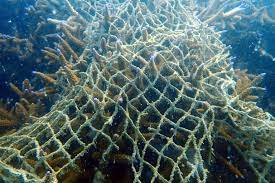Most of the plastic pollution on coral reefs is believed to be caused by fishing gear
According to recent study published in the journal Nature, fishing gear plastic made up approximately three-quarters of the plastic trash identified by underwater visual surveys of coral reefs in the Indian, Pacific, and Atlantic seas. An international team of researchers from the University of Oxford (UK), University of Sao Paulo (Brazil), California Academy of Sciences (US), and other collaborators discovered that debris increased with depth and is related to proximity to marine protected areas, revealing the extent of plastic pollution on coral reefs.
Over 1,200 visual surveys were undertaken by the researchers in 84 shallow and mesophotic reef habitats spread across 14 nations. Between 30 and 150 meters below the surface are coral reefs known as mesophotic, or “twilight zone” reefs.
Macroplastics greater than five centimeters made about 88% of the overall trash.
Nearly every area investigated included human-made garbage, including some of the planet’s most distant and unspoiled coral reefs, such those on deserted islands in the central Pacific.
The Marshall Islands, a coral island chain in eastern Micronesia (Oceania), had the lowest density of plastic pollution, while Comoros, an island chain off the southeast coast of Africa, had the highest, with approximately 84,500 pieces per square kilometer.
The research discovered that plastic pollution on coral reefs was higher than in other marine ecosystems examined, and that it peaked in the mesophotic zone after rising with depth.
Since deeper reefs are often distant from sources of plastic pollution, the discovery that trash increased with depth was unexpected, according to Luiz Rocha, senior author of the research and curator of ichthyology at the Academy.
“Fishing gear appears to contribute a large proportion of the plastic seen on mesophotic reefs,” said co-author Lucy Woodall, associate professor in marine conservation biology and policy at University of Exeter, UK. “Even as debris continues to catch marine life through what we call ghost fishing.”
According to Woodall, “Unfortunately, general waste management interventions frequently do not reduce the amount of fishing gear debris. Therefore, specific solutions related to the needs of fishers should be considered, such as the free disposal of damaged gear in ports or the individual labeling of gear to ensure fishers take responsibility for lost equipment.
According to Hudson Pinheiro, a biologist at the University of Sao Paulo and the study’s lead author, pollution negatively affects the entire coral reef ecosystem. “From macroplastics that spread coral diseases to fishing lines that entangle and harm the structural complexity of the reef, decreasing both fish abundance and diversity, pollution negatively impacts the entire coral reef ecosystem,” he said.
According to Pinheiro, “humans who depend on marine resources are turning to deeper habitats and those that are closer to marine protected areas where fish remain abundant.”
The scientists believed that conservation efforts may be refocused to better safeguard and guarantee a prosperous future for coral reefs on Earth.
Author of the research and marine scientist at the University of Oxford Paris Stefanoudis said that “the findings of our global study shine a light on one of the many threats that deep reefs face today.” These habitats need to be preserved and specifically taken into account in management plans since they are ecologically and physiologically distinct, similar to their shallow-water siblings. KRS KRS KRS PTI







